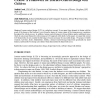Free Online Productivity Tools
i2Speak
i2Symbol
i2OCR
iTex2Img
iWeb2Print
iWeb2Shot
i2Type
iPdf2Split
iPdf2Merge
i2Bopomofo
i2Arabic
i2Style
i2Image
i2PDF
iLatex2Rtf
Sci2ools
AIEDU
2006
2006
CARSS: A Framework for Learner-Centred Design with Children
Learner-centred design (LCD) is a nebulous concept. It can range from attempts to design with the needs of the learner at the forefront, to involving the learner at various stages of the design process, sometimes throughout the whole process. In addition, learner-centred design involving children implies additional issues which do not present themselves when using an LCD approach with adults. In this paper, we argue that current LCD frameworks do not consider the full range of issues necessary for successful design. We propose CARSS (Context, Activities, Roles, Stakeholders, Skills), a learner-centred design framework specifically for child learners, and describe two design case studies which demonstrate the framework in use. Keywords. Learner-centred participatory design, design frameworks, software design with children
| Added | 10 Dec 2010 |
| Updated | 10 Dec 2010 |
| Type | Journal |
| Year | 2006 |
| Where | AIEDU |
| Authors | Judith Good, Judy Robertson |
Comments (0)

